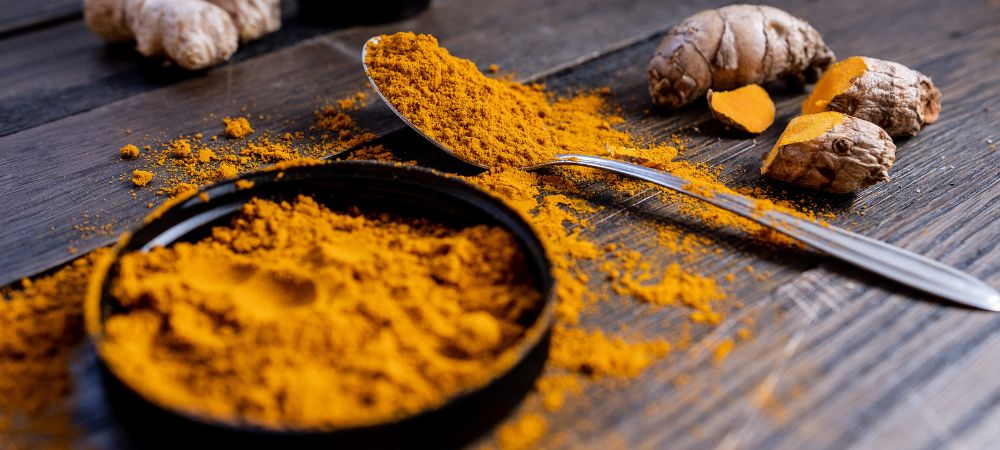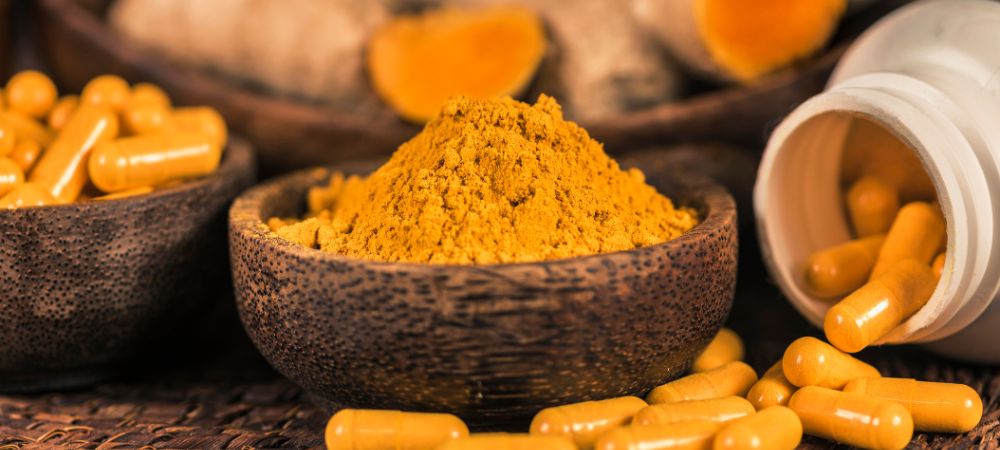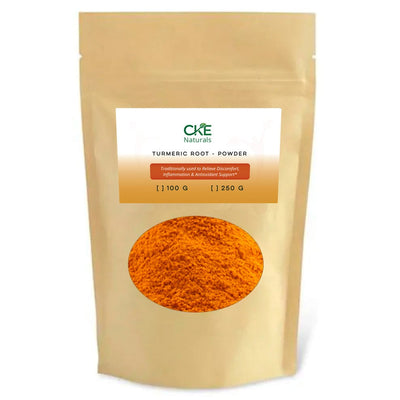How Much Turmeric Powder per Day [2024 Guide] for Optimal Well-being
Turmeric, often hailed as the "golden spice" for its vibrant color and myriad health benefits, has cemented its place in both culinary and medicinal worlds. Originating from the roots of the Curcuma longa plant, it has been a cornerstone in traditional medicine across various cultures for millennia.
Turmeric owes its potent health-promoting properties to curcumin, a compound celebrated for its powerful anti-inflammatory and antioxidant effects. In the modern wellness landscape, turmeric is increasingly sought after, not just as a culinary additive but as a holistic supplement aimed at bolstering overall health.
This comprehensive guide delves into determining how much turmeric powder per day for 2024 will do wonders for your health while aligning with contemporary research and expert insights.
Understanding Turmeric and Its Components

Turmeric, a root belonging to the ginger family, is not just a staple in culinary traditions, especially in South Asia, but it's also revered for its medicinal properties. Its vibrant yellow-orange color is as distinctive as its benefits, primarily attributed to curcumin, the main active ingredient. Here's a closer look at turmeric's composition and its health benefits:
- Curcumin: The star compound of turmeric, known for its anti-inflammatory and antioxidant properties. Curcumin directly combats oxidative stress and inflammation, two common pathways in many chronic diseases.
- Volatile Oils: Turmeric contains various volatile oils, including tumerone, atlantone, and zingiberene. These oils contribute to its anti-inflammatory and antimicrobial effects.
- Other Compounds: Besides curcumin and volatile oils, turmeric contains over 300 naturally occurring components, including vitamins (such as vitamins C and E), minerals (including iron and potassium), and other antioxidants, enhancing its profile as a health supplement.
The benefits of turmeric are vast, ranging from reducing inflammation and pain in conditions like arthritis to supporting heart health, improving brain function, and potentially reducing cancer risk. Its antioxidant properties also help combat oxidative damage, a critical factor in aging and many diseases.
Recommended Daily Intake of Turmeric Powder
Determining the right amount of turmeric powder to consume daily for health benefits requires careful consideration of various factors. Here’s what current research and expert recommendations suggest:
- General Recommendation: 500-2,000 mg of turmeric extract is often recommended for general health benefits, including anti-inflammatory and antioxidant effects. This range typically contains 70-95% curcuminoids.
Factors Influencing Dosage
- Age: Older adults may require a lower dose due to potential interactions with medications and slower metabolism.
- Health Conditions: Individuals with specific conditions like arthritis or digestive issues might benefit from tailored dosages.
- Form of Turmeric: Curcumin absorption is low when turmeric is consumed in its natural spice form. Therefore, formulations that include piperine (found in black pepper) or are part of a liposomal delivery system can enhance bioavailability.
It's important to note that while turmeric is safe for most people, consuming high doses or taking supplements without medical advice can lead to adverse effects, including gastrointestinal disturbances. Always consult with a healthcare provider to determine the most appropriate dosage based on personal health needs and conditions.
How to Incorporate Turmeric into Your Daily Diet

Incorporating turmeric into your daily diet offers a fusion of flavor and health benefits, making it a worthwhile endeavor for anyone looking to enhance their well-being through natural means. With its powerful active ingredient, curcumin, turmeric root extract boasts anti-inflammatory and antioxidant properties that can contribute significantly to a healthier lifestyle. Here are detailed ways to seamlessly integrate turmeric into your meals and snacks, ensuring you harness its full potential without compromising on taste or convenience.
Start with Smoothies
- Nutrient-Packed Morning Boost: Begin your day with a nutrient-packed smoothie by adding a teaspoon of turmeric powder. This infuses your smoothie with a health kick and introduces a warm, spicy undertone that complements the natural sweetness of fruits.
- Combination Ideas: Pair organic turmeric powder with mango, pineapple, banana, or avocado. These fruits mask turmeric's potent flavor and blend well to create a creamy, rich texture. Add a pinch of black pepper to enhance the bioavailability of curcumin, ensuring your body absorbs more of this beneficial compound.
- Recipe Suggestion: Try a tropical turmeric smoothie by blending 1 cup of pineapple chunks, one banana, one teaspoon of turmeric powder, a pinch of black pepper, ½ cup of coconut milk, and ice. This refreshing and healthful smoothie is perfect for starting your day on a bright note.
Spice Up Your Soups
- Enhance Flavor and Nutrition: Adding turmeric to soups and stews enriches them with a vibrant color and boosts their nutritional value. Its earthy flavor complements a wide range of ingredients without overpowering the dish.
- Soup Pairings: Turmeric pairs exceptionally well with lentil soup, chicken broth, and vegetable stews. Its versatility makes it a staple in creamy and broth-based soups.
- Cooking Tip: To maximize flavor and health benefits, sauté turmeric with a little oil and onions as the base for your soup. This method releases the spice's essential oils, deepening the dish's overall flavor profile.
Turmeric Tea or Golden Milk
- Soothing Beverages: Turmeric tea and golden milk are traditional drinks known for their soothing and anti-inflammatory properties. They are perfect for winding down after a long day or as a comforting beverage in the morning.
- Golden Milk Recipe: For golden milk, gently simmer one teaspoon of turmeric powder, 2 cups of milk (dairy or plant-based), one teaspoon of honey (or to taste), and a dash of black pepper on the stove until warm. This drink is not only soothing but also beneficial for your immune system.
- Turmeric Tea Preparation: Brew turmeric tea by adding one teaspoon of turmeric powder to hot water and lemon and honey for taste. This simple concoction is a potent antioxidant drink that can help fight inflammation and boost your immune system.
Seasoning for Meats and Vegetables
- Versatile Seasoning: Turmeric's unique flavor and color make it an excellent seasoning for meats, fish, and vegetables. It adds a subtle earthiness and a beautiful golden hue to dishes, enhancing their visual appeal and nutritional value.
- Marinade Ideas: Create marinades by mixing turmeric powder with olive oil, garlic, lemon juice, and herbs of your choice. This combination works well for chicken, fish, and vegetable skewers, imparting a rich flavor and color.
- Cooking Tip: When seasoning dishes with turmeric, add it early in the cooking process to allow its flavor to meld with the other ingredients, enhancing the dish's overall taste.
Turmeric in Grains
- Colorful and Nutritious Grains: Incorporating turmeric into grains such as rice, quinoa, or couscous adds a delightful pop of color and enriches these staples with health-promoting properties.
- Cooking Method: Add a teaspoon of turmeric powder for grains to the cooking water or broth. This not only imparts a beautiful golden color but also infuses the grains with turmeric's health benefits.
- Serving Suggestion: Serve turmeric-infused grains as a side dish with a variety of meals, from grilled meats and vegetables to curries and stews, to add both color and nutrition to your plate.
Healthy Snacking
- Antioxidant-Rich Snacks: Turmeric can transform ordinary snacks into antioxidant-rich treats. Adding it to homemade hummus or sprinkling it on popcorn are just a couple of ways to enjoy its benefits.
- Hummus Recipe: Blend chickpeas, tahini, lemon juice, garlic, and a teaspoon of turmeric powder to prepare a vibrant and healthful hummus. Serve with vegetables or whole-grain crackers for a nutritious snack.
- Turmeric Popcorn: Toss freshly popped popcorn with a mixture of melted coconut oil, turmeric powder, and a pinch of salt for a tasty and healthful snack. This is an excellent way to satisfy cravings without compromising on health.
Incorporating turmeric into your diet is a simple yet effective way to enhance your health and enjoy a variety of flavorful meals and snacks. By adopting these tips and recipes, you can easily make turmeric a regular part of your dietary routine, reaping its numerous benefits daily.
Precautions and Potential Side Effects
While turmeric is celebrated for its health benefits, it's crucial to be aware of its potential side effects and interactions with medications. Here are some precautions to keep in mind:
- Digestive Issues: High doses of turmeric may cause gastrointestinal problems, such as stomach pain, gas, and bloating, especially in those with sensitive stomachs.
- Blood Thinning Effect: Turmeric can slow blood clotting, posing a risk for people on blood-thinning medications like warfarin. Consult your doctor if you're taking any such medications.
- Impact on Gallbladder: Individuals with gallbladder disease should avoid turmeric as it can exacerbate gallstone formation due to its stimulation of bile production.
- Interference with Medications: Turmeric may interact with medications, including those for diabetes and acid reflux, altering their effectiveness.
- Pregnancy and Nursing: While culinary amounts are generally safe, pregnant and nursing mothers should avoid high doses of turmeric supplements as there's insufficient research on its safety.
- Allergic Reactions: Though rare, some people may experience allergic reactions to turmeric, including skin rashes or hives.
When adding turmeric to your diet, start with small amounts to gauge your body's reaction, and consult a healthcare provider if you have any pre-existing health conditions or are taking medications. This ensures you can enjoy the turmeric root benefits without adverse effects.
Turmeric Supplements vs. Powder: What's Best for You?

Choosing between turmeric powder and supplements depends on your health objectives, lifestyle, and personal preferences. Here's a detailed comparison to help you make an informed decision:
Turmeric Powder
Benefits
- Culinary Versatility: Turmeric powder is widely used in cooking, offering a unique flavor and color to dishes. It's easily incorporated into meals, drinks, and snacks.
- Whole Food Benefit: Consuming whole spices may provide additional nutrients and compounds that work synergistically, potentially offering broader health benefits.
- Cost-Effective: Generally, turmeric powder is more affordable than supplements and readily available in grocery stores.
Drawbacks
- Lower Curcumin Concentration: The curcumin content in turmeric powder is relatively low (about 2-5%), which might make it difficult to achieve therapeutic levels through diet alone.
- Absorption Issues: Without enhancers like black pepper, the bioavailability of curcumin from turmeric powder is limited.
Turmeric Supplements
Benefits
- Higher Curcumin Levels: Supplements often contain concentrated curcumin, providing a more potent dose likely to impact health significantly.
- Enhanced Absorption: Many supplements include ingredients like piperine to improve curcumin absorption, making them more effective.
- Convenience: Supplements offer a quick and easy way to consume curcumin without meal preparation.
Drawbacks
- Cost: High-quality turmeric supplements can be expensive, especially if taken regularly.
- Potential for Additives: Some supplements may contain fillers, additives, or lower-quality ingredients.
- Regulation Variability: The supplement industry's regulation can be less stringent than for food products, raising concerns about quality and efficacy.
In summary, supplements might be the better choice if you're looking for a convenient, high-dose form of curcumin with enhanced bioavailability. However, if you enjoy cooking and prefer a whole-food approach to health, incorporating turmeric powder into your diet could be more beneficial.
The Science Behind Turmeric's Health Benefits
The health benefits of turmeric, primarily attributed to its curcumin content, have been extensively studied. Here's a look at key findings from scientific research:
- Anti-inflammatory Properties: Numerous studies have shown that curcumin has potent anti-inflammatory effects, comparable to some pharmaceuticals, but without the side effects. This makes turmeric beneficial for conditions like arthritis and other inflammatory disorders.
- Antioxidant Effects: Curcumin is a powerful antioxidant that can neutralize free radicals, chemicals that can cause damage to the body's cells. This helps prevent cellular damage and aging.
- Brain Health: Research indicates that curcumin boosts levels of the brain hormone BDNF, which increases the growth of new neurons and fights various degenerative processes in the brain.
- Heart Health: Studies suggest that curcumin improves the function of the endothelium, the lining of the blood vessels, which is crucial for heart health. Its anti-inflammatory and antioxidant properties also reduce the risk of heart disease.
- Cancer Prevention: There is evidence that curcumin can affect cancer growth, development, and spread at the molecular level and may help reduce the growth of cancerous cells and inhibit the growth of tumors in animal studies and lab experiments.
- Digestive Health: Curcumin has been used to treat digestive issues like dyspepsia and ulcerative colitis, showing improvements in symptom management and gut health.
It's important to note that while the research is promising, more human studies are needed to understand the extent of turmeric's health benefits fully. Moreover, the effectiveness of turmeric and curcumin can vary widely depending on the individual's health status, dosage, and form of consumption.
Conclusion
Turmeric, with its potent active ingredient curcumin, offers many health benefits ranging from anti-inflammatory and antioxidant properties to aiding digestion and boosting brain health. Incorporating turmeric into your daily diet, whether through powder in your meals or supplements for a more concentrated dose, can significantly enhance your overall well-being.
For those looking to integrate this powerful spice into their health regimen, consider choosing high-quality turmeric supplements and powder. Explore CKE Naturals' range of premium turmeric products, carefully formulated to ensure you receive the maximum health benefits. Start your journey towards optimal health today with CKE Naturals.
FAQs
The recommended daily intake of turmeric for health benefits varies, but for general wellness, consuming 500 to 2,000 mg of turmeric extract, which contains 70-95% curcuminoids, is often advised. When using turmeric powder from your kitchen, incorporating about 1 to 3 grams into your meals throughout the day can be beneficial. However, consulting with a healthcare provider is recommended for specific health conditions or desired outcomes to determine the appropriate dosage.
Turmeric supplements are a convenient option to ensure you get a concentrated dose of curcumin, the active compound in turmeric. Supplements are especially beneficial if seeking therapeutic effects for specific health issues. However, when choosing supplements, look for those with added piperine or formulated for enhanced absorption to maximize their effectiveness.
Turmeric is generally safe for most people when consumed in culinary amounts. However, in high doses, turmeric supplements can cause side effects such as digestive issues, nausea, and dizziness, especially if taken on an empty stomach. Additionally, turmeric can interact with certain medications, including blood thinners and diabetes medications, so it's essential to consult a healthcare provider before starting any new supplement regimen.
The bioavailability of curcumin is relatively low, but you can enhance its absorption by combining turmeric with black pepper. Black pepper contains piperine, a natural substance that increases curcumin absorption by up to 2,000%. Adding a healthy fat source, such as olive oil or coconut milk, can also help since curcumin is fat-soluble.
While turmeric is safe for most individuals, there are exceptions. Pregnant and breastfeeding women should consult their healthcare provider before increasing turmeric intake. People with gallbladder disease, kidney stones, or those on blood-thinning medications should also exercise caution.
Yes, one of the most well-documented benefits of turmeric is its ability to reduce inflammation and alleviate joint pain, particularly in conditions like arthritis. Curcumin's anti-inflammatory properties are comparable to some anti-inflammatory drugs, making it a natural alternative for managing inflammation and pain.
When selecting a turmeric supplement, look for products that specify the amount of curcumin or curcuminoids they contain. Choose supplements with third-party certification for quality and purity. Additionally, supplements formulated with black pepper extract (piperine) or other absorption enhancers are preferable.
Moderate cooking does not destroy turmeric's beneficial properties; it may help activate certain compounds, making them more available. However, excessive heat for prolonged periods might degrade some of its active ingredients. To preserve its health benefits, add turmeric towards the end of the cooking process when possible.



